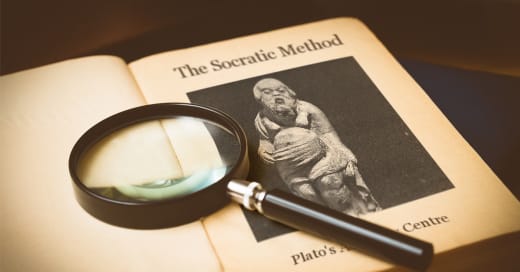This episode is part of the Plato’s Academy Centre course on the Socratic Method. In this lesson, we will be learning about modern applications of Socratic Questioning. We’ll begin by looking at the main Socratic technique of cognitive psychotherapy, and then at some helpful variations.
Socrates' method of questioning has influenced many different educational approaches, and been used in fields as diverse as law and medicine.
What is Socratic Questioning?
The Socratic Method has influenced countless thinkers throughout the centuries, all the way down to the present age. Of course, its most obvious impact has been in academic philosophy. Socrates' method of questioning, though, has influenced many different educational approaches, and been used in fields as diverse as law and medicine. Speaking of his use of the term “Socratic Questioning”, Aaron T. Beck, one of the pioneers of cognitive-behavioural therapy (CBT) said in an interview:
I came across the notion of Socratic Dialogue when I read about it in my college philosophy course – I believe it was in Plato’s Republic.
Beck's early methods of Socratic Questioning led to many subsequent variations, which became central to all cognitive psychotherapy. All of these approaches use the term "Socratic" very loosely, often just to refer to the notion of teaching by asking questions as opposed to lecturing didactically. As we've shown, hopefully, there was a lot more to the original Socratic Method than just asking lots of questions. Nevertheless, we can learn from the types of questions that have been developed by modern practitioners, especially in the counselling and psychotherapy fields. Some of these are perhaps even questions that Socrates himself would have found helpful.
Questioning Evidence
It has often been said that the basic question used in early cognitive therapy, by Beck and his colleagues, was simply: Where is the evidence for that? This is a great question. Researchers and clinicians in psychology, medicine, and other fields, are in the habit of asking this question at conferences about the claims being made by their peers. It's part of the scientific method.
Clients undergoing cognitive therapy or counselling are also asked the same question with regard to beliefs that may be contributing to their emotional or behavioural problems. For example, a depressed client may believe that nobody likes them and that they are worthless. The therapist, after some initial trust-building and assessment, will often encourage the client to ask where the evidence is for those sort of beliefs. (It's really the client who should be doing the questioning, ultimately, although at first the therapist models this behaviour.)
This can be taken a step further by, like Socrates did, drawing up two-columns, although today we usually use the trusty flipchart or whiteboard. One column contains evidence supporting the belief in question ("Nobody likes me") and the other column contains evidence against it being true. Sometimes clients may need to carry out "empirical" tests, or "behavioural experiments", in order to gather information. For instance, they might even survey their friends asking them for their honest opinions about how likeable they are.
Someone who worries anxiously might think "What if something catastrophic happens? I won't be able to cope!" They could question whether or not that's true but we know today that it's often more helpful to target the underlying assumptions. For instance, worriers often assume that thinking like this could be helpful or that their worries in general are realistic. We can check the evidence for that on a flipchart retrospectively, based on past experience, by asking “How many of the things you worried about actually happened?” We could also check it prospectively by actually keeping track of how often their worries turn out to be false over the following weeks. If you're creative, you can probably think up many other ways the evidence for and against troubling beliefs could be questioned or tested out in our experience.
Questioning Helpfulness
A different approach consists in asking how helpful our beliefs are in practice. Arguably this is further away from Socratic philosophy because Socrates was mainly concerned with how true beliefs are, regardless of whether or not they're helpful. Nevertheless, it often makes sense for clients in therapy to examine the consequences of holding different attitudes and, in reality, this often motivates them to reconsider the truth of their problematic assumptions. For example, you might believe that smoking cigarettes calms your nerves. In reality, cigarettes are neurostimulants, although people temporarily relax when they smoke, their heart rate will go up higher than normal shortly afterwards – smoking cigarettes causes stress in other words. The belief that they help smokers relax is something of an illusion as they only do this short-term but make them far less relaxed in the longer-term.
The simplest version of this type of questioning is to ask yourself: How helpful is that belief? We can ask the same question about our behaviour as well. If you wanted to take the same line of questioning further you might ask about the consequences of some attitude or way of thinking. Therapists often like to ask the magic question: "How's that working out for you?"
Delving deeper, if we have the time and inclination, we might ask what the pros and cons (advantages and disadvantages) are of holding some belief. We can even distinguish the short-term pros and cons from the longer term ones. For instance, smoking may help you feel relaxed in the short term (pro) only to raise your heart rate and causes more stress in the long-term (con). Once again, we can, of course, draw a two-column diagram, if we like, with one side headed pros and the other cons.
Generally we consider the personal consequences or pros and cons. Sometimes, though, you might also want to consider the consequences of a troubling attitude or behaviour for your loved ones, or for different aspects of your life such as relationships, work, physical health, mental health, etc. Dividing the consequences up into various domains of life often helps us to evaluate the wider impact of our thinking and behaviour.
In addition to questioning the evidence for and the helpfulness of our beliefs, cognitive therapists use a strategy described as questioning the logic of our reasoning. We'll be examining that more in the next lesson, where we'll discuss how it compares to the way philosophers learn to spot common logical fallacies.
If you're interested in discussing online you can join our Substack Note thread about "How can we best define wisdom?" and subscribe to the Plato’s Academy Centre on Substack.
Regards,
Donald Robertson
President of The Plato's Academy Centre
















Share this post